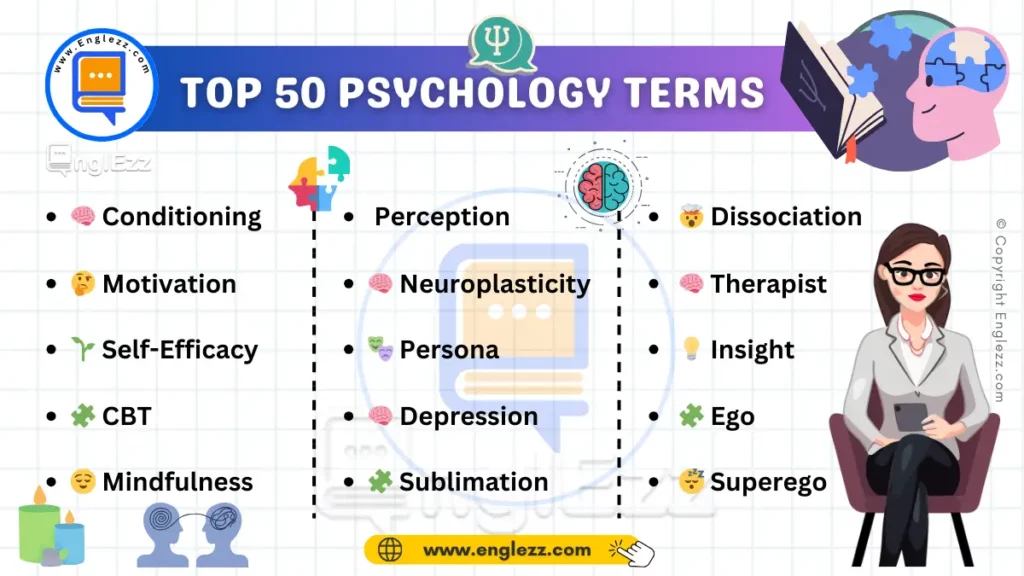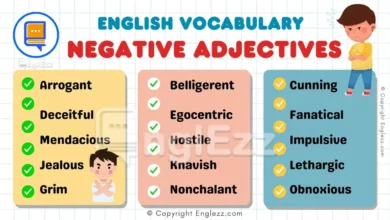Understanding psychological terminology is crucial for grasping the nuances of human behavior and mental processes. Whether you’re a student, a professional, or just curious about the field, familiarizing yourself with common psychology terms can significantly enhance your comprehension and application of psychological concepts. This blog post aims to explain 50 of the most common psychology English terms, providing clear definitions, phonetic transcriptions, and practical examples for each term.
50 Most Common Psychology English Terms Explained with Examples
By breaking down these terms and illustrating their usage, this guide will help demystify complex psychological language and make it more accessible. Dive in to expand your psychological vocabulary and better understand the principles that underpin mental health and human behavior.
#1. 📊 Cognitive Dissonance
Definition: The mental discomfort experienced when holding two or more conflicting beliefs or attitudes.
Phonetic Transcription: /ˈkɒɡ.nɪ.tɪv ˈdɪs.ə.nəns/
Examples:
- Feeling uneasy about recycling while knowing its importance.
- A person who values health but frequently eats junk food may experience cognitive dissonance.
#2. 🧠 Conditioning
Definition: A learning process in which behavior is shaped by reinforcement or punishment.
Phonetic Transcription: /kənˈdɪʃ.ən.ɪŋ/
Examples:
- Pavlov’s dogs salivating at the sound of a bell.
- Training a dog to sit on command using treats.
#3. 🤔 Motivation
Definition: The process that initiates, guides, and maintains goal-oriented behaviors.
Phonetic Transcription: /ˌmoʊ.tɪˈveɪ.ʃən/
Examples:
- Studying hard for an exam to achieve a high grade.
- Exercising regularly to improve overall health.
#4. 🌱 Self-Efficacy
Definition: Belief in one’s ability to succeed in specific situations.
Phonetic Transcription: /ˈsɛlf ˈɛf.ɪ.kə.si/
Examples:
- Confidence in delivering a presentation.
- Belief in one’s ability to overcome challenges at work.
#5. 🧩 Cognitive Behavioral Therapy (CBT)
Definition: A therapeutic approach that addresses dysfunctional emotions and behaviors through goal-oriented strategies.
Phonetic Transcription: /ˈkɒɡ.nɪ.tɪv ˈbiː.hæv.i.ər.əl ˈθɛr.ə.pi/
Examples:
- Using CBT to manage anxiety by changing negative thought patterns.
- Applying CBT techniques to reduce stress and improve coping strategies.
#6. 😌 Mindfulness
Definition: The practice of being aware and present in the moment without judgment.
Phonetic Transcription: /ˈmaɪnd.fəl.nəs/
Examples:
- Practicing mindfulness meditation to reduce stress.
- Being fully engaged during a conversation to improve interpersonal relationships.
#7. 🧑⚕️ Therapist
Definition: A trained professional who provides mental health care and support.
Phonetic Transcription: /ˈθɛrəpɪst/
Examples:
- Seeing a therapist for weekly counseling sessions.
- Seeking therapy to work through emotional challenges and personal issues.
#8. 📉 Depression
Definition: A mood disorder characterized by persistent sadness and loss of interest in activities.
Phonetic Transcription: /dɪˈprɛʃ.ən/
Examples:
- Feeling overwhelmed and sad for an extended period.
- Losing interest in hobbies and social activities that were once enjoyable.
#9. 🧑🔬 Behaviorism
Definition: A theory of learning based on the idea that all behaviors are acquired through conditioning.
Phonetic Transcription: /bɪˈheɪ.vjər.ɪ.zəm/
Examples:
- Using rewards to reinforce positive behavior in children.
- Studying how environmental factors influence behavior patterns.
#10. 🔄 Reinforcement
Definition: The process of encouraging or establishing a pattern of behavior by offering rewards or punishments.
Phonetic Transcription: /ˌriː.ɪnˈfɔːrs.mənt/
Examples:
- Providing a treat for a dog when it follows a command.
- Receiving praise for completing tasks to motivate continued effort.

#11. 📖 Schema
Definition: A cognitive framework or concept that helps organize and interpret information.
Phonetic Transcription: /ˈskiː.mə/
Examples:
- Using a schema of “restaurant” to understand and predict what will happen during a dining experience.
- Applying a schema for “friendship” to interpret social interactions.
#12. 🔍 Perception
Definition: The process by which individuals interpret and organize sensory information to make it meaningful.
Phonetic Transcription: /pəˈsɛp.ʃən/
Examples:
- Recognizing a familiar face in a crowd.
- Understanding the meaning of a complex visual scene.
#13. 🧠 Neuroplasticity
Definition: The brain’s ability to reorganize itself by forming new neural connections throughout life.
Phonetic Transcription: /ˌnjʊə.roʊ.plæˈstɪs.ɪ.ti/
Examples:
- Recovering cognitive functions after a stroke.
- Learning a new skill that changes brain activity patterns.
#14. 🎭 Persona
Definition: The social facade or outward identity that a person presents to others.
Phonetic Transcription: /pərˈsoʊ.nə/
Examples:
- Adopting a professional persona at work.
- Displaying a more relaxed persona in social settings with friends.
#15. 🧠 Attachment Theory
Definition: A psychological model describing the dynamics of long-term relationships between humans.
Phonetic Transcription: /əˈtæʧ.mənt ˈθɪə.ri/
Examples:
- Secure attachment in infants leading to healthy adult relationships.
- Anxious attachment affecting relationship dynamics in adulthood.
#16. 🧩 Sublimation
Definition: The process of channeling socially unacceptable impulses into acceptable activities.
Phonetic Transcription: /ˌsʌb.lɪˈmeɪ.ʃən/
Examples:
- Channeling aggressive impulses into competitive sports.
- Using creative expression to deal with frustration.
#17. 🧠 Ego
Definition: The part of the personality that mediates between the id, the superego, and reality.
Phonetic Transcription: /ˈiː.ɡoʊ/
Examples:
- Balancing personal desires with societal norms.
- Navigating social interactions with a sense of self-awareness.
#18. 🎯 Goal Setting
Definition: The process of defining objectives and creating a plan to achieve them.
Phonetic Transcription: /ɡoʊl ˈsɛt.ɪŋ/
Examples:
- Setting a career goal to advance to a managerial position.
- Creating a study schedule to improve academic performance.
#19. 🧪 Experimental Psychology
Definition: The branch of psychology focused on conducting experiments to understand mental processes and behavior.
Phonetic Transcription: /ɪkˌspɛr.ɪˈmɛn.təl saɪˈkɒl.ə.dʒi/
Examples:
- Conducting a study on memory recall using controlled conditions.
- Researching the effects of sleep deprivation on cognitive performance.
#20. 🧠 Introspection
Definition: The examination of one’s own conscious thoughts and feelings.
Phonetic Transcription: /ˌɪn.trəˈspɛk.ʃən/
Examples:
- Reflecting on personal emotional responses to a stressful event.
- Analyzing one’s own decision-making process in a significant life choice.
#21. 🧑🎓 Psychoanalysis
Definition: A therapeutic approach that explores unconscious motives and conflicts influencing behavior.
Phonetic Transcription: /ˌsaɪ.koʊˈæn.ə.lɪsɪs/
Examples:
- Analyzing dreams to uncover repressed emotions.
- Exploring childhood experiences to understand current behavior patterns.
#22. 🤯 Dissociation
Definition: A mental process used to cope with stress by separating thoughts, memories, or emotions from conscious awareness.
Phonetic Transcription: /dɪˌsoʊ.siˈeɪ.ʃən/
Examples:
- Experiencing detachment during a traumatic event.
- Feeling disconnected from one’s surroundings in a stressful situation.
#23. 🧠 Freud’s Id, Ego, Superego
Definition: Freud’s model of the psyche, where the id represents basic desires, the ego mediates reality, and the superego encompasses moral standards.
Phonetic Transcription: /frɔɪdz ɪd, ˈiː.ɡoʊ, ˈsuː.pər.iˌɡoʊ/
Examples:
- The id driving impulsive behavior.
- The ego balancing immediate desires with long-term consequences.
- The superego enforcing ethical standards.
#24. 💡 Insight
Definition: The ability to gain an accurate and deep understanding of a person or thing.
Phonetic Transcription: /ˈɪn.saɪt/
Examples:
- Gaining clarity about personal motivations through therapy.
- Understanding the underlying causes of a behavior pattern.
#25. 🧩 Projective Tests
Definition: Psychological tests where individuals project their own unconscious thoughts and feelings onto ambiguous stimuli.
Phonetic Transcription: /prəˈdʒɛk.tɪv tɛsts/
Examples:
- The Rorschach inkblot test.
- Thematic Apperception Test (TAT) used to reveal emotional states.
#26. 😴 Sleep Deprivation
Definition: A condition resulting from inadequate sleep, affecting cognitive and emotional functions.
Phonetic Transcription: /sliːp ˌdɛprɪˈveɪʃən/
Examples:
- Difficulty concentrating after several nights of insufficient sleep.
- Increased irritability and mood swings due to lack of rest.
#27. 💔 Emotional Intelligence
Definition: The ability to recognize, understand, and manage one’s own emotions, and to recognize and influence the emotions of others.
Phonetic Transcription: /ɪˈmoʊ.ʃə.nəl ɪnˈtɛl.ɪ.dʒəns/
Examples:
- Navigating a heated discussion with empathy and calm.
- Understanding and responding appropriately to others’ emotional needs.
#28. 🧩 Operant Conditioning
Definition: A learning process where behavior is controlled by consequences, such as rewards and punishments.
Phonetic Transcription: /ˈɒp.ər.ənt kənˈdɪʃ.ən.ɪŋ/
Examples:
- A teacher rewarding students with praise for good performance.
- A child being grounded for misbehavior as a form of punishment.
#29. 🌟 Self-Actualization
Definition: The realization or fulfillment of one’s talents and potential, often considered the highest level of psychological development.
Phonetic Transcription: /ˌsɛlf ˌæk.tʃuː.əl.aɪˈzeɪ.ʃən/
Examples:
- Pursuing a passion project that fulfills personal goals.
- Achieving a sense of personal fulfillment and purpose in life.
#30. 🧠 Social Learning Theory
Definition: A theory suggesting that people learn behaviors through observation, imitation, and modeling.
Phonetic Transcription: /ˈsoʊ.ʃəl ˈlɜːrnɪŋ ˈθɪəri/
Examples:
- Children learning aggressive behavior by observing aggressive models.
- Acquiring language skills through social interactions and mimicry.
#31. 🧑⚕️ Psychiatrist
Definition: A medical doctor specializing in diagnosing and treating mental health disorders, often with medication.
Phonetic Transcription: /saɪˈkaɪə.trɪst/
Examples:
- Prescribing medication for severe depression.
- Conducting assessments and providing treatment plans for mental illnesses.
#32. 💭 Cognitive Bias
Definition: Systematic patterns of deviation from norm or rationality in judgment, leading to illogical conclusions.
Phonetic Transcription: /ˈkɒɡ.nɪ.tɪv ˈbaɪəs/
Examples:
- Confirmation bias, where one favors information that confirms pre-existing beliefs.
- Anchoring bias, where initial information unduly influences decision-making.
#33. 🌈 Positive Reinforcement
Definition: The introduction of a pleasant stimulus following a desired behavior, increasing the likelihood of that behavior occurring again.
Phonetic Transcription: /ˈpɒz.ɪ.tɪv ˌriː.ɪnˈfɔːrs.mənt/
Examples:
- Praising a child for completing their homework on time.
- Giving a bonus for exceeding performance targets at work.
#34. 🔄 Negative Reinforcement
Definition: The removal of an unpleasant stimulus following a desired behavior, increasing the likelihood of that behavior recurring.
Phonetic Transcription: /ˈnɛɡ.ə.tɪv ˌriː.ɪnˈfɔːrs.mənt/
Examples:
- Stopping nagging once a child completes their chores.
- Turning off an annoying alarm when you get out of bed.
#35. 🧠 Humanistic Psychology
Definition: A psychological perspective emphasizing the study of the whole person and the uniqueness of each individual.
Phonetic Transcription: /ˌhjuː.məˈnɪs.tɪk saɪˈkɒl.ə.dʒi/
Examples:
- Focusing on personal growth and self-fulfillment in therapy.
- Promoting self-actualization and personal potential in psychological practice.
#36. 🌡️ Stress Response
Definition: The physiological and psychological changes that occur when an individual perceives a threat or challenge.
Phonetic Transcription: /strɛs rɪˈpɒns/
Examples:
- Experiencing increased heart rate and anxiety before a big presentation.
- Feeling a rush of adrenaline when facing a sudden danger.
#37. 🔬 Psychometrics
Definition: The field of study concerned with the theory and technique of psychological measurement, including testing and assessment.
Phonetic Transcription: /ˌsaɪ.kəʊˈmɛt.rɪks/
Examples:
- Developing standardized tests to measure cognitive abilities.
- Analyzing data from personality assessments to understand traits.
#38. 🧠 Impulse Control
Definition: The ability to resist or delay an impulse to engage in a behavior or action.
Phonetic Transcription: /ˈɪm.pʌls kənˈtroʊl/
Examples:
- Refraining from impulsively buying items while shopping.
- Controlling the urge to interrupt someone during a conversation.
#39. 🧑⚕️ Clinical Psychology
Definition: The branch of psychology focused on diagnosing and treating mental health disorders and emotional issues.
Phonetic Transcription: /ˈklɪn.ɪ.kəl saɪˈkɒl.ə.dʒi/
Examples:
- Providing therapy for individuals with anxiety disorders.
- Conducting psychological assessments for mental health conditions.
#40. 🔍 Intelligence Quotient (IQ)
Definition: A measure of a person’s intellectual abilities relative to others, often obtained through standardized testing.
Phonetic Transcription: /ɪnˈtɛl.ɪ.dʒəns ˈkwoʊ.ʃənt/
Examples:
- Using IQ tests to assess cognitive abilities for educational placement.
- Evaluating IQ scores to understand intellectual strengths and weaknesses.
#41. 🌟 Maslow’s Hierarchy of Needs
Definition: A theory proposing that humans are motivated by a hierarchy of needs, from basic physiological needs to self-actualization.
Phonetic Transcription: /ˈmæz.loʊz ˈhaɪə.rɑːr.ki əv niːdz/
Examples:
- Seeking safety and security after fulfilling basic physiological needs.
- Pursuing personal growth and self-fulfillment once psychological needs are met.
#42. 🤝 Social Facilitation
Definition: The tendency for individuals to perform better on simple or well-practiced tasks in the presence of others.
Phonetic Transcription: /ˈsoʊ.ʃəl fəˌsɪl.ɪˈteɪ.ʃən/
Examples:
- Performing better on a familiar task in a group setting.
- Feeling more motivated to complete a task when observed by others.
#43. 🔄 Reciprocal Determinism
Definition: A theory stating that personal, behavioral, and environmental factors all influence each other in a continuous loop.
Phonetic Transcription: /rɪˈsɪp.rə.kəl dɪˈtɜːr.mɪ.nɪ.zəm/
Examples:
- A person’s behavior influencing their environment, which in turn affects their behavior.
- Personal traits, such as confidence, shaping how one interacts with their surroundings.
#44. 🧩 Confirmation Bias
Definition: The tendency to search for, interpret, and remember information that confirms one’s preexisting beliefs.
Phonetic Transcription: /ˌkɒn.fəˈmeɪ.ʃən ˈbaɪəs/
Examples:
- Only seeking out news sources that align with your political views.
- Remembering instances that confirm your belief in your own competence.
#45. 🔄 Cognitive Behavioral Model
Definition: A framework that explains how thoughts, feelings, and behaviors are interconnected and influence each other.
Phonetic Transcription: /ˈkɒɡ.nɪ.tɪv bɪˈheɪ.vjər.əl ˈmɒd.əl/
Examples:
- Identifying and altering negative thought patterns to change behavior.
- Using behavioral experiments to challenge irrational beliefs.
#46. 🧠 Attribution Theory
Definition: A theory that examines how individuals explain the causes of behavior and events.
Phonetic Transcription: /ˌæt.rɪˈbjuː.ʃən ˈθɪəri/
Examples:
- Attributing a colleague’s lateness to personal laziness rather than external factors.
- Explaining personal success as a result of hard work rather than luck.
#47. 🌱 Growth Mindset
Definition: The belief that abilities and intelligence can be developed through dedication and hard work.
Phonetic Transcription: /ɡroʊθ ˈmaɪnd.set/
Examples:
- Embracing challenges as opportunities for growth.
- Persisting in learning new skills despite initial failures.
#48. 🔄 Learned Helplessness
Definition: A state in which an individual feels unable to change or control a situation after repeated failures.
Phonetic Transcription: /lɜːrnd ˈhɛl.pə.ləs.nəs/
Examples:
- Feeling powerless after multiple failed attempts to solve a problem.
- Avoiding challenges due to a belief that effort will be futile.
#49. 🤔 Self-Serving Bias
Definition: The tendency to attribute positive outcomes to oneself and negative outcomes to external factors.
Phonetic Transcription: /ˌsɛlf ˈsɜːr.vɪŋ ˈbaɪəs/
Examples:
- Taking credit for a successful project while blaming external factors for a failure.
- Perceiving oneself as a good driver while attributing accidents to other drivers.
#50. 🧠 Dual-Process Theory
Definition: A theory suggesting that there are two systems for processing information: a fast, automatic system and a slow, deliberate system.
Phonetic Transcription: /ˈdjuː.əl ˈprəʊ.sɛs ˈθɪəri/
Examples:
- Making quick, intuitive decisions in familiar situations.
- Carefully analyzing complex problems using deliberate thought.
Psychology English Terms Table
| #2. 🧠 Conditioning | #12. 🔍 Perception | #22. 🤯 Dissociation |
| #3. 🤔 Motivation | #13. 🧠 Neuroplasticity | #23. 🧠 Freud’s Id, Ego, Superego |
| #4. 🌱 Self-Efficacy | #14. 🎭 Persona | #24. 💡 Insight |
| #5. 🧩 CBT | #15. 🧠 Attachment Theory | #25. 🧩 Projective Tests |
| #6. 😌 Mindfulness | #16. 🧩 Sublimation | #26. 😴 Sleep Deprivation |
| #7. 🧑⚕️ Therapist | #17. 🧠 Ego | #27. 💔 Emotional Intelligence |
| #8. 📉 Depression | #18. 🎯 Goal Setting | #28. 🧩 Operant Conditioning |
| #9. 🧑🔬 Behaviorism | #19. 🧪 Experimental Psychology | #29. 🌟 Self-Actualization |
| #10. 🔄 Reinforcement | #20. 🧠 Introspection | #30. 🧠 Social Learning Theory |
| #32. 💭 Stress Response | #42. 🤝 Social Facilitation | #31. 💭 Stress Response |
| #33. 🔬 Psychometrics | #43. 🔄 Reciprocal Determinism | #51. 🔬 Psychometrics |
| #34. 🧠 Impulse Control | #44. 🔍 Confirmation Bias | #52. 🧠 Impulse Control |
| #35. 🧠 Humanistic Psychology | #45. 🔄 Cognitive Behavioral Model | #53. 🧠 Humanistic Psychology |
| #36. 🌡️ Stress Response | #46. 🧠 Attribution Theory | #54. 🌡️ Stress Response |
| #37. 🔍 Psychometrics | #47. 🌱 Growth Mindset | #55. 🔍 Psychometrics |
| #38. 🧠 Impulse Control | #48. 🔄 Learned Helplessness | #56. 🧠 Impulse Control |
| #39. 🧑⚕️ Clinical Psychology | #49. 🤔 Self-Serving Bias | #57. 🧑⚕️ Clinical Psychology |
| #40. 🔍 IQ | #50. 🧠 Dual-Process Theory | #58. 🔍 IQ |
Conclusion
Mastering psychological terminology not only enriches your understanding but also enhances your ability to engage in meaningful discussions about mental health and behavior. This comprehensive list of 50 common psychology terms, with their definitions, phonetic transcriptions, and examples, serves as a valuable resource for anyone looking to deepen their knowledge in the field.
By familiarizing yourself with these key concepts, you can better comprehend the complexities of human psychology and apply this knowledge in practical settings. Whether for academic purposes, professional development, or personal curiosity, this guide is designed to make psychological terms more accessible and applicable.
Keep exploring and learning to fully grasp the fascinating world of psychology!









Ready to level up your understanding of psychology? Dive into our ultimate guide featuring 50 essential psychology terms explained with clear definitions and real-life examples. Whether you’re a student, professional, or just curious, this post will sharpen your psychological vocabulary and insight. Follow us and like @EnglEzz for more great content! Check it out here:
.
https://www.englezz.com/common-psychology-english-terms/
.
#EnglEzz #Vocabulary #Linguistics #Psychology #MentalHealth #Learning #Education #Therapy #Behavior